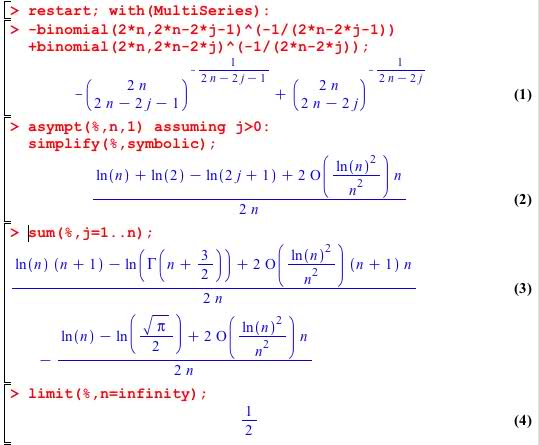Experimentation suggests the limit $$\lim_{n\rightarrow\infty} (-1)^n\sum_{k=1}^n(-1)^k{n\choose k}^{-1/k}=\frac{1}{2}\ .$$ Does somebody have an idea for (a start of) a proof?
Added: There seem to be variations: $$\lim_{n\rightarrow\infty} (-1)^n\sum_{k=1}^n(-1)^k{2n\choose k}^{-1/k}=\frac{1}{8}\ ,$$ $$\lim_{n\rightarrow\infty} (-1)^n\sum_{k=1}^n(-1)^k{3n\choose k}^{-1/k}=\frac{2}{27}\ ,$$ etc.
Moreover, the exponent $-1/k$ in the original identity can seemingly be replaced by $-2/k$, $-3/k$ (by $-\alpha/k$ for strictly positive $\alpha$?) without changing the limit value.
Update: Given a strictly positive rational number $\frac{p}{q}\leq 1$ (with coprime natural integers $p,q$), there is perhaps a number $\lambda(p/q)$ such that $$\lim_{n\rightarrow\infty}(-1)^n\sum_{k=1}^{pn}(-1)^k{qn\choose k}^{-\alpha/k}= \frac{(\lambda(p/q))^\alpha}{2}$$ for $\alpha$ real and strictly positive. A few values for $\lambda$ are seemingly $$\lambda\left(\frac{1}{3}\right)=\frac{4}{27},\ \lambda\left(\frac{1}{2}\right)=\frac{1}{4},\ \lambda\left(\frac{2}{3}\right)=\frac{2}{3\sqrt{3}},\ \lambda\left(1\right)=1\ .$$ Two more conjectures: $\lambda\left(\frac{1}{q}\right)=\frac{(q-1)^{q-1}}{q^q}$ and $\lambda(x)^x=\lambda(1-x)^{1-x}$ for rational $x$ in $(0,1)$.
The correct formula for $\lambda$ is perhaps $\lambda(x)=x(1-x)^{(1-x)/x}$.

